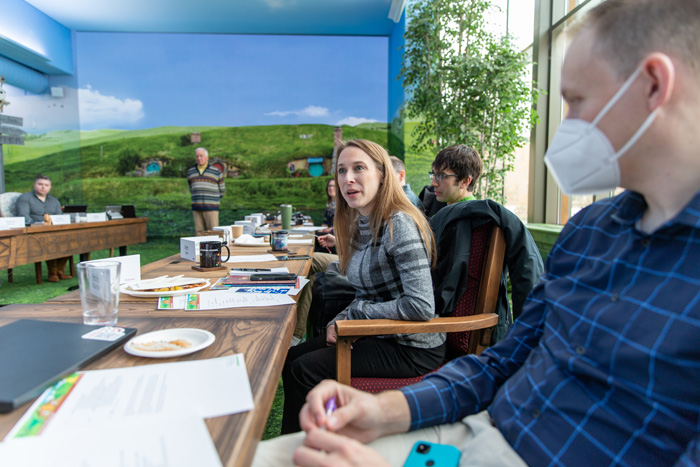An Epic Exchange

President Jones, Dickinson Faculty Visit Epic Systems to Share Knowledge on Data Science
by Matt Getty
President John E. Jones III ’77, P’11, and several Dickinson professors visited the alumna-founded health care software giant Epic this spring to share knowledge on the growing field of data science. With topics ranging from artificial intelligence to ethics and privacy, the full-day meeting gave Dickinson mathematics, computer science, data analytics and philosophy professors the chance to learn from, and exchange best practices with, Epic founder and CEO Judy Faulkner ’65 as well as more than 20 staff members working at the intersection of medicine and information technology.
“Judy is one of the most successful alums in Dickinson history, and what she’s done with Epic is a testament to power and flexibility of a Dickinson liberal-arts education,” said Jones. “So having the opportunity to connect with her and her staff for a full day and really dig into the kind of data issues our students need to understand to thrive in the future was truly incredible.”
During the meeting, Faulkner shared her story of creating and building Epic from a basement apartment house with a single computer and two half-time assistants into a sprawling 1,670-acre campus outside of Madison, Wis., with more than 13,000 employees helping health care professionals track data on more than 280 million patients. Now in use at over 2,700 hospitals and by more than 480,000 doctors, Epic has transitioned health care organizations over the last several decades from storing data on paper siloed in hospital basements to digital records that travel with the patient from provider to provider.
“The big thing I did was I put the patient at the center and then put all the data around the patient,” said Faulkner, whom Forbes and other business publications have named to lists, including Modern Healthcare’s 100 Most Influential People in Healthcare. "And that has continued as our philosophy ever since.”

During the meeting, Judy Faulkner ’65 shared the story of how she launched and grew Epic Systems into the health care data giant it is today.
Beyond building Epic into the success it is today, that approach has saved countless lives by increasing vital information sharing among hospitals, doctors and clinics as well as aiding in medical research. WellSpan Health, for example, uses Epic’s software to monitor patients for sepsis, and estimates the technology allows them to save 227 lives a year. Similarly, MetroHealth uses Epic’s technology to screen patients at risk for opioid overdose, reporting the program has saved roughly 2,500 lives over seven years. And there are countless other examples of how the company’s innovative approach to software and data science has made a lasting positive impact on health care worldwide.
“As we’ve been building the data analytics program at Dickinson, it is important for us to connect with alumni who are working in the field and using the latest tools and technology,” said Associate Professor of Economics & Data Analytics Emily Marshall, who participated in the meeting along with Professor of Mathematics & Data Analytics Dick Forrester, Professor of Computer Science John MacCormick, Assistant Professor of Philosophy Amy McKiernan, Vice President of Information and Technology Services Jill Forrester and Vice President for College Advancement Carlo Robustelli. “From the beginning, this program was born out of not only faculty forming a community around data science, but also alumni who had a similar idea at the same time. So it’s important for us to continue to connect with alumni leaders in the field like Judy as we continue to evolve this new major.”

Emily Marshall, associate professor of economics & data analytics, who attended the event along with several other Dickinson faculty members, discussed how Dickinson’s data analytics program grew out of, and will continue to evolve through, co-innovation efforts with alumni in the field like Faulkner.
To that end, the event included discussions on what students need to prepare for careers in data science. Conversations also touched on how to foster innovation, how to harness artificial intelligence and machine learning while safeguarding patient data, and the possibility of brining students to Epic for Career Pathways trips in the future. Participants also got a chance to tour Epic’s impressive campus, which includes many playfully themed spaces designed to resemble Willy Wonka’s Chocolate Factory, scenes from Alice in Wonderland, Grand Central Station and more.
“Needless to say we are very proud of her,” Jones said of Faulkner, who received an honorary Doctor of Civic Engagement degree during last year’s Commencement. “She’s truly a great example of the power of a Dickinson education, and what she’s built here is extraordinary. You can look at Epic online and see pictures, but unless you experience this place firsthand, it's really hard to describe.”

President Jones marvels at one of Epic’s dining halls, which is designed to resemble Grand Central Station.
The trip also included a Dickinson Forward Tour reception in Madison so that alumni in the area could meet President Jones and learn more about his vision for the college. Faulkner and three Dickinson graduates who work at Epic—Jamie Doyle ’10, Seth Tracy ’12 and Brett McGeehan ’05—attended a dinner with Jones and the visiting Dickinson faculty and staff before also joining the event.

Brett McGeehan ’05, one of several Dickinson graduates working at Epic, connects with other local Wisconsin alumni during the Dickinson Forward Tour event.
After stops in Florida, Wisconsin and Richmond this spring, the Dickinson Forward Tour headed overseas with events in Paris and London. Learn more about the Dickinson Forward Tour at http://www.dickinson.edu/forwardtour.
TAKE THE NEXT STEPS
Published May 1, 2023